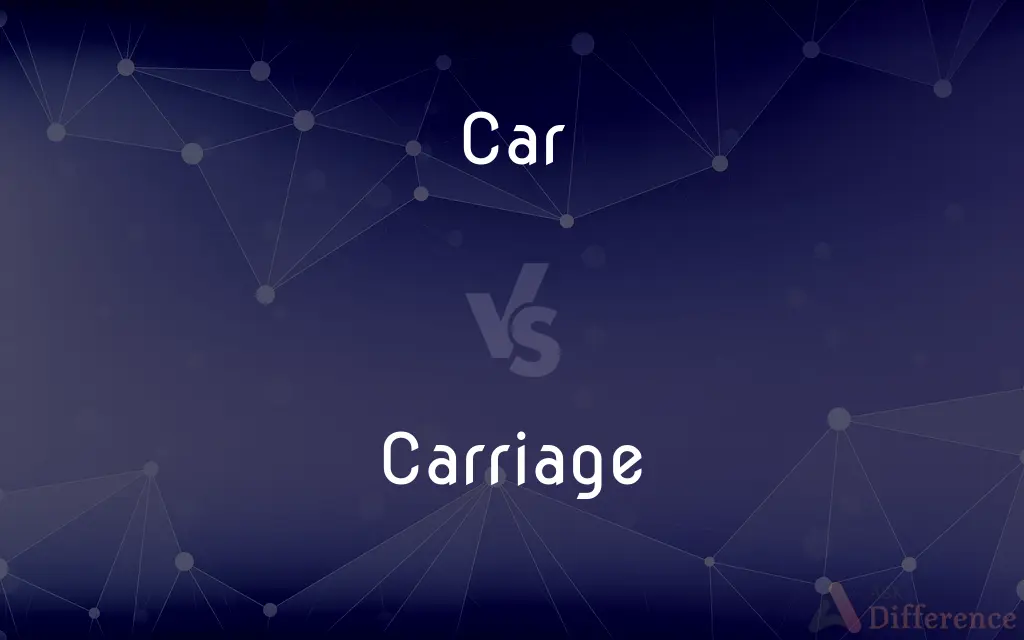Car vs. Carriage — What's the Difference?
By Urooj Arif & Fiza Rafique — Updated on April 4, 2024
A car is a modern motor vehicle for transportation, using internal combustion engines or electric motors, whereas a carriage is a horse-drawn vehicle from earlier times designed for passenger transport.

Difference Between Car and Carriage
Table of Contents
ADVERTISEMENT
Key Differences
A car is propelled by an internal combustion engine or an electric motor, making it suitable for individual use and long-distance travel. On the other hand, a carriage is drawn by horses, making it more historical and less efficient for modern transportation needs.
Cars are equipped with modern technologies such as GPS, air conditioning, and safety features like airbags and ABS. Meanwhile, carriages offer a nostalgic experience but lack these technological advancements and safety features.
The design of cars is influenced by aerodynamics and modern engineering, aimed at speed and efficiency. In contrast, carriages have a design rooted in craftsmanship and historical aesthetics, focusing on comfort and style over speed.
Cars are integral to the global economy, manufactured on a large scale and accessible to a broad audience. Conversely, carriages have become niche, often reserved for ceremonial purposes or as tourist attractions in specific locales.
Cars contribute significantly to environmental pollution due to emissions from combustion engines, although electric cars offer a cleaner alternative. Carriages, while environmentally friendlier, are impractical for the transportation demands of modern society.
ADVERTISEMENT
Comparison Chart
Propulsion
Internal combustion engine or electric motor
Horse-drawn
Era
Modern
Historical
Technological Features
GPS, air conditioning, safety features (airbags, ABS)
None
Design Focus
Aerodynamics, efficiency, speed
Craftsmanship, historical aesthetics, comfort
Role in Economy
Integral, widely manufactured and used
Niche, ceremonial purposes or tourist attractions
Environmental Impact
High due to emissions, though electric cars are cleaner
Lower, but impractical for modern transportation needs
Compare with Definitions
Car
A product of significant economic activity, from manufacturing to maintenance.
The car industry is a major employer in the manufacturing sector.
Carriage
Used for special occasions or tourist attractions in modern times.
Tourists enjoy carriage tours of the historic city center.
Car
A modern vehicle powered by an engine or motor designed for road transport.
She drove her car to work every day.
Carriage
Represents craftsmanship and traditional aesthetics.
The handcrafted carriage showcased exquisite historical craftsmanship.
Car
A contributor to urban traffic and environmental challenges.
The increase in car ownership has led to higher traffic congestion and pollution.
Carriage
A horse-drawn vehicle used historically for passenger transport.
They took a carriage ride through the park for their anniversary.
Car
An automobile equipped with various technological advancements for comfort and safety.
His car features the latest in navigation and safety technology.
Carriage
Requires the care and maintenance of both the vehicle and horses.
Keeping a carriage means looking after the horses and maintaining the vehicle.
Car
A symbol of personal freedom and mobility in the modern era.
Owning a car gave her the freedom to travel anywhere she wanted.
Carriage
A symbol of pre-industrial society and romance.
Weddings often feature carriage rides to add a touch of historical romance.
Car
A car (or automobile) is a wheeled motor vehicle used for transportation. Most definitions of cars say that they run primarily on roads, seat one to eight people, have four wheels, and mainly transport people rather than goods.Cars came into global use during the 20th century, and developed economies depend on them.
Carriage
A carriage is a private four-wheeled vehicle for people and is most commonly horse-drawn. Second-hand private carriages were common public transport, the equivalent of modern cars used as taxis.
Car
An automobile.
Carriage
A wheeled vehicle, especially a four-wheeled horse-drawn passenger vehicle, often of an elegant design.
Car
A vehicle, such as a streetcar, that runs on rails
A railroad car.
Carriage
Chiefly British A railroad passenger car.
Car
A boxlike enclosure for people or cargo on a conveyance
An elevator car.
Carriage
A baby carriage.
Car
The part of a balloon or airship that carries people or cargo.
Carriage
A wheeled support or frame for carrying a heavy object, such as a cannon.
Car
(Archaic) A chariot, carriage, or cart.
Carriage
A moving part of a machine for holding or shifting another part
The carriage of a typewriter.
Car
A wheeled vehicle that moves independently, with at least three wheels, powered mechanically, steered by a driver and mostly for personal transportation.
She drove her car to the mall.
Carriage
The act or process of transporting or carrying.
Car
(dated) A wheeled vehicle, drawn by a horse or other animal; a chariot.
Carriage
(kărē-ĭj) The cost of or the charge for transporting.
Car
A four-wheeled cab, as opposed to a (two-wheeled) Hansom cab.
Carriage
The manner of holding and moving one's head and body; bearing.
Car
An unpowered unit in a railroad train.
The conductor coupled the cars to the locomotive.
Carriage
(Archaic) Management; administration.
Car
(rail transport) an individual vehicle, powered or unpowered, in a multiple unit.
The 11:10 to London was operated by a 4-car diesel multiple unit.
Carriage
The act of conveying; carrying.
Car
(rail transport) A passenger-carrying unit in a subway or elevated train, whether powered or not.
From the frontmost car of the subway, he filmed the progress through the tunnel.
Carriage
Means of conveyance.
Car
A rough unit of quantity approximating the amount which would fill a railroad car.
We ordered five hundred cars of gypsum.
Carriage
A (mostly four-wheeled) lighter vehicle chiefly designed to transport people, generally drawn by horse power.
The carriage ride was very romantic.
Car
The moving, load-carrying component of an elevator or other cable-drawn transport mechanism.
Fix the car of the express elevator - the door is sticking.
Carriage
A railroad car
Car
The passenger-carrying portion of certain amusement park rides, such as Ferris wheels.
The most exciting part of riding a Ferris wheel is when your car goes over the top.
Carriage
The manner or posture in which one holds or positions a body part, such as one's arm or head.
The runner has a very low arm carriage.
Car
The part of an airship, such as a balloon or dirigible, which houses the passengers and control apparatus.
Carriage
A manner of walking and moving in general; how one carries oneself, bearing, gait.
Car
(sailing) A sliding fitting that runs along a track.
Carriage
(archaic) One's behaviour, or way of conducting oneself towards others.
Car
The aggregate of desirable characteristics of a car.
Buy now! You can get more car for your money.
Carriage
The part of a typewriter supporting the paper.
Car
(US) A floating perforated box for living fish.
Carriage
A shopping cart.
Car
A clique or gang.
Carriage
(British) A stroller; a baby carriage.
Car
(obsolete) A turn.
Carriage
The charge made for conveying (especially in the phrases carriage forward, when the charge is to be paid by the receiver, and carriage paid).
Car
(programming) The first part of a cons in Lisp. The first element of a list.
Carriage
(archaic) That which is carried, baggage
Car
A small vehicle moved on wheels; usually, one having but two wheels and drawn by one horse; a cart.
Carriage
That which is carried; burden; baggage.
David left his carriage in the hand of the keeper of the carriage.
And after those days we took up our carriages and went up to Jerusalem.
Car
A vehicle adapted to the rails of a railroad.
Carriage
The act of carrying, transporting, or conveying.
Nine days employed in carriage.
Car
A chariot of war or of triumph; a vehicle of splendor, dignity, or solemnity.
The gilded car of day.
The towering car, the sable steeds.
Carriage
The price or expense of carrying.
Car
The stars also called Charles's Wain, the Great Bear, or the Dipper.
The Pleiads, Hyads, and the Northern Car.
Carriage
That which carries of conveys,
Car
The cage of a lift or elevator.
Carriage
The manner of carrying one's self; behavior; bearing; deportment; personal manners.
His gallant carriage all the rest did grace.
Car
The basket, box, or cage suspended from a balloon to contain passengers, ballast, etc.
Carriage
The act or manner of conducting measures or projects; management.
The passage and whole carriage of this action.
Car
A floating perforated box for living fish.
Carriage
A railcar where passengers ride
Car
4-wheeled motor vehicle; usually propelled by an internal combustion engine;
He needs a car to get to work
Carriage
A vehicle with four wheels drawn by two or more horses
Car
A wheeled vehicle adapted to the rails of railroad;
Three cars had jumped the rails
Carriage
Characteristic way of bearing one's body;
Stood with good posture
Car
A conveyance for passengers or freight on a cable railway;
They took a cable car to the top of the mountain
Carriage
A machine part that carries something else
Car
Car suspended from an airship and carrying personnel and cargo and power plant
Carriage
A small vehicle with four wheels in which a baby or child is pushed around
Car
Where passengers ride up and down;
The car was on the top floor
Common Curiosities
How fast can a car go compared to a carriage?
Cars can reach much higher speeds than carriages.
What powers a car?
Cars are powered by internal combustion engines or electric motors.
Can carriages be used for daily transport today?
While possible, carriages are impractical for daily transport in modern society.
Do carriages have any safety features?
Carriages lack modern safety features found in cars.
How have cars impacted urban development?
Cars have significantly influenced urban planning and infrastructure development.
Do all cars use gasoline?
No, cars can be powered by gasoline, diesel, or electricity.
Are cars environmentally friendly?
Traditional cars contribute to pollution, but electric cars offer a cleaner alternative.
Can carriages be found in cities today?
Yes, mainly for ceremonial purposes or as tourist attractions.
Are there electric carriages?
Traditional carriages are not electric, though there are modern interpretations like electric tourist carts.
Are cars more expensive than carriages?
The cost varies, but cars generally involve higher purchase and maintenance costs.
What kind of maintenance does a car require?
Cars require mechanical maintenance and regular check-ups.
Is it practical to use a carriage for long-distance travel?
No, carriages are unsuitable for long-distance travel due to their speed and comfort limitations.
What role do carriages play in modern society?
Carriages serve a niche role, often associated with tourism, ceremonies, or historical reenactments.
How do cars contribute to air pollution?
Cars emit pollutants from combustion engines, contributing to air pollution.
What is the main difference between a car and a carriage?
The main difference is their propulsion; cars use engines or motors, while carriages are horse-drawn.
Share Your Discovery

Previous Comparison
Optimize vs. Optimise
Next Comparison
Mane vs. VaneAuthor Spotlight
Written by
Urooj ArifUrooj is a skilled content writer at Ask Difference, known for her exceptional ability to simplify complex topics into engaging and informative content. With a passion for research and a flair for clear, concise writing, she consistently delivers articles that resonate with our diverse audience.
Co-written by
Fiza RafiqueFiza Rafique is a skilled content writer at AskDifference.com, where she meticulously refines and enhances written pieces. Drawing from her vast editorial expertise, Fiza ensures clarity, accuracy, and precision in every article. Passionate about language, she continually seeks to elevate the quality of content for readers worldwide.















































